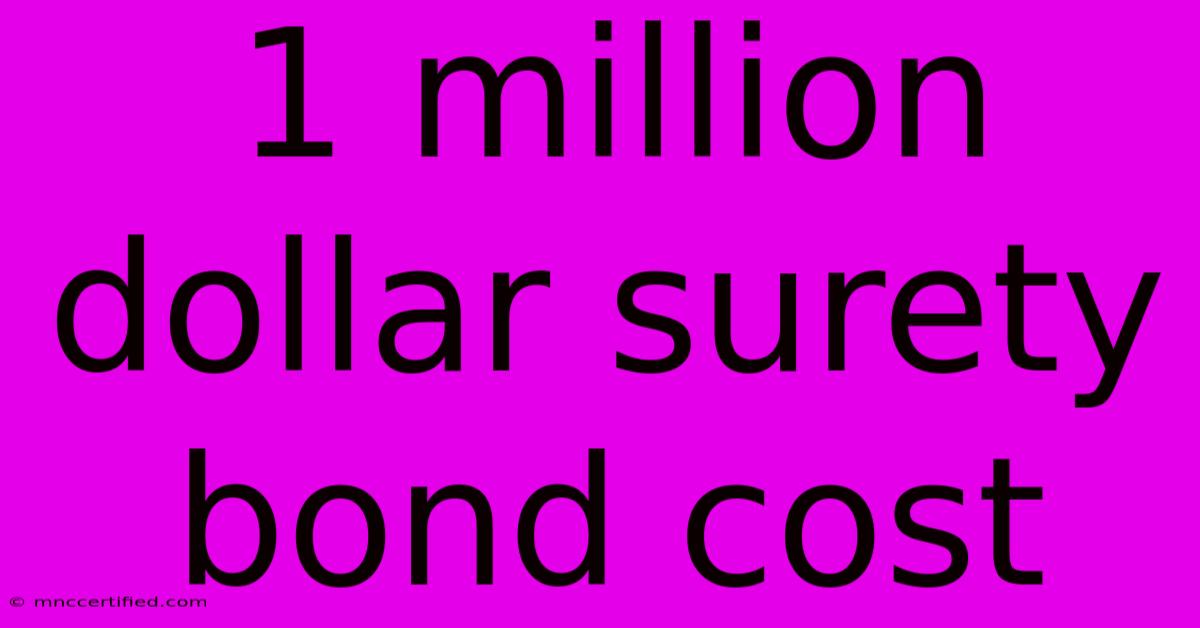1 Million Dollar Surety Bond Cost

Table of Contents
Decoding the Cost of a $1 Million Surety Bond
Securing a $1 million surety bond is a significant undertaking, often required for substantial contracts, licenses, or court mandates. Understanding the cost involved is crucial before proceeding. This comprehensive guide breaks down the factors influencing the price of a $1 million surety bond and helps you navigate the process effectively.
What Influences the Cost of a $1 Million Surety Bond?
The cost of a surety bond, often expressed as a percentage of the bond amount, isn't fixed. Several key factors determine the final price you'll pay:
1. Your Credit Score: The Biggest Factor
Your credit score is paramount. Surety companies view you as a risk, and a higher credit score indicates lower risk, translating to a lower premium. A credit score above 700 is generally ideal, securing the most favorable rates. Scores below 650 might significantly increase the cost or even prevent you from qualifying.
2. Your Business Financial Strength
For businesses, financial health is meticulously assessed. Surety companies analyze factors like:
- Revenue: Higher revenue generally signifies greater financial stability and reduces risk.
- Profitability: Consistent profits demonstrate your ability to meet financial obligations.
- Debt-to-equity ratio: A healthy ratio indicates responsible financial management.
- Years in business: Established businesses often secure better rates than newer ones.
- Industry: Certain high-risk industries may face higher premiums.
3. The Type of Bond
Different types of surety bonds carry varying risk profiles, influencing the cost:
- Contract Bonds: These secure the performance of a contract and usually involve larger sums.
- License and Permit Bonds: Required for specific licenses or permits, these bonds typically involve smaller amounts.
- Fidelity Bonds: These protect against employee dishonesty and can have varying costs based on the coverage amount.
- Court Bonds: Mandated by courts, these bonds have specific requirements and costs based on the legal context.
4. The Surety Company
Different surety companies have different underwriting standards and pricing models. Shopping around and comparing quotes from multiple companies is crucial to secure the best rate.
5. The Bond Term
The length of the bond term affects the cost. Longer terms might lead to higher premiums, while shorter terms generally mean lower costs.
Estimating the Cost: What to Expect
While an exact cost for a $1 million surety bond is impossible without a thorough risk assessment, you can expect the premium to range from 1% to 15% of the bond amount. This means the cost could be anywhere from $10,000 to $150,000.
Factors leading to higher costs:
- Low credit score
- Weak financial statements
- High-risk industry
- Complex or unusual bond requirements
Factors leading to lower costs:
- Excellent credit score
- Strong financial statements
- Low-risk industry
- Simple bond requirements
How to Secure the Best Rate for Your $1 Million Surety Bond
- Improve your credit score: Address any negative marks on your credit report and maintain responsible credit habits.
- Strengthen your financial position: Improve your business's financial health through sound financial management.
- Shop around: Obtain quotes from multiple surety companies to compare pricing and terms.
- Work with a surety bond broker: Brokers can navigate the process for you, accessing a wider range of options and potentially securing better rates.
- Provide complete and accurate documentation: This will streamline the underwriting process and avoid delays.
Conclusion: Planning is Key
Obtaining a $1 million surety bond requires careful planning and preparation. Understanding the factors influencing cost and taking proactive steps to improve your financial standing will significantly improve your chances of securing a favorable rate. Remember, proactive planning and thorough research are essential for navigating the complexities of surety bonds successfully.

Thank you for visiting our website wich cover about 1 Million Dollar Surety Bond Cost. We hope the information provided has been useful to you. Feel free to contact us if you have any questions or need further assistance. See you next time and dont miss to bookmark.
Featured Posts
-
Packers Win Blocked Fg On Final Play
Nov 18, 2024
-
Gold Bond Commercial Actress Name
Nov 18, 2024
-
Family Bonding Activities Near Me
Nov 18, 2024
-
England Snow Warning 10 Cities Monday Alert
Nov 18, 2024
-
I M A Celebs Tulisa Key Facts
Nov 18, 2024